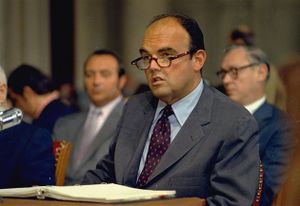John Ehrlichman
(lawyer) | ||||||||||||
|---|---|---|---|---|---|---|---|---|---|---|---|---|
 | ||||||||||||
| Born | John Daniel Ehrlichman 1925-03-20 Tacoma, Washington, U.S. | |||||||||||
| Died | 1999-02-14 (Age 73) Atlanta, Georgia, U.S. | |||||||||||
| Alma mater | University of California, Los Angeles, Stanford Law School | |||||||||||
| Religion | Christian Science | |||||||||||
| Spouse | Karen Hilliard | |||||||||||
| Exposed | “War on Drugs” | |||||||||||
| Party | Republican | |||||||||||
Nixon insider who blew in 1994 the whistle on the "War on Drugs"
| ||||||||||||
John Ehrlichman was a White House aide who famously admitted to Harper's Magazine that the "war on drugs" was a fraud.
“You want to know what this was really all about. The Nixon campaign in 1968, and the Nixon White House after that, had two enemies: the antiwar left and black people. You understand what I’m saying. We knew we couldn’t make it illegal to be either against the war or black, but by getting the public to associate the hippies with marijuana and blacks with heroin, and then criminalizing both heavily, we could disrupt those communities. We could arrest their leaders, raid their homes, break up their meetings, and vilify them night after night on the evening news. Did we know we were lying about the drugs? Of course we did.”
John Ehrlichman (1994) [1]
Jeffrey Donfeld, Jerome H. Jaffe and Robert DuPont sent a joint statement in 2016 to The Huffington Post which claimed that John Ehrlichman either didn't sat that, or if did then he was being sarcastic.[2]
A Quote by John Ehrlichman
| Page | Quote | Date | Source |
|---|---|---|---|
| Blowback | “You want to know what this was really all about. The Nixon campaign in 1968, and the Nixon White House after that, had two enemies: the antiwar left and black people. You understand what I’m saying. We knew we couldn’t make it illegal to be either against the war or black, but by getting the public to associate the hippies with marijuana and blacks with heroin, and then criminalizing both heavily, we could disrupt those communities. We could arrest their leaders, raid their homes, break up their meetings, and vilify them night after night on the evening news. Did we know we were lying about the drugs? Of course we did.” | 1994 | Harper's Magazine |